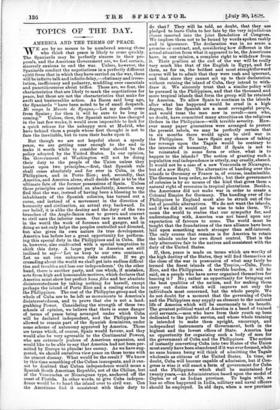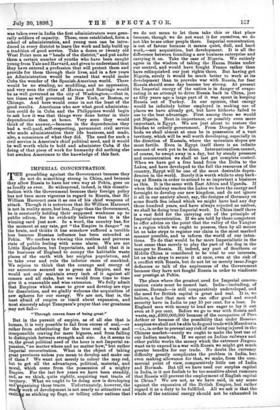TOPICS OF THE DAY.
AMERICA AND THE TERMS OF PEACE.
WE are by no means to be numbered among those who think that peace is likely to come quickly. The Spaniards may be perfectly sincere in their pro- posals, and the American Government are, we feel certain, sincerely anxious to end the war. Unless, however, the Spaniards conduct the negotiations in a perfectly different spirit from that in which they have carried on the war, there will be infin ite talk and infinite delay,—obstinacy and irreso- lution, inefficiency and pedantry, muddling over essentials and punctiliousness about trifles. These are, we fear, the characteristics that are likely to mark the negotiations for peace, but these are not the characteristics that make for swift and businesslike action. As Bacon said long ago, the Spaniards " have been noted to be of small despatch. Mi venga la Muerte de Spagna,—Let my death come from Spaine ; for then it will be sure to be long in coming." Unless, then, the Spanish nature has changed in the last few weeks, it would seem impossible to look for a quick release for the unhappy men at Madrid, who have behind them a people whose first thought is not to face the inevitable, but to turn their backs upon it.
But though we are not hopeful about a speedy peace, we are getting near enough to the end to make it worth while to consider what should be the policy adopted by the United States. In our opinion, the Government at Washington will not be doing their duty to the people of the Union unless they insist upon two principles,—first, that Spanish rule shall cease absolutely and for ever in Cuba, in the Philippines, and in Porto Rico ; and, secondly, that America, and America alone, shall decide what is to be the ultimate fate of the former possessions of Spain. Unless these principles are insisted on absolutely, America may find that the war, instead of having been a blessing to the inhabitants of the Spanish colonies, has turned out a curse, and instead of a movement in the direction of humanity and civilisation, an actual step backward. In our belief, it is alike the destiny and the duty of the two branches of the Anglo-Saxon race to govern and convert to civil uses the inferior races. Our race is meant to do in the world the work of foreman and ganger, and in doing so not only helps the peoples controlled and directed, but also gives its own nature its true development. America has before her a great opportunity for perform. ing this special duty in the Philippines and in Cuba. She is, however, also confronted with a special temptation to shirk this duty. A large party in America are still inclined to say—' Let us keep to our own continent. Let us not run unknown risks outside. If we go crusading about the world we shall get into endless difficul- ties and troubles and lose our independence.' On the other band, there is another party, and one which, if mistaken, acts from high and honourable motives, which declares that America must show her perfect bona fides and her absolute disinterestedness by taking nothing for herself, except perhaps the island of Porto Rico and a coaling station in the Philippines. The rest of the Philippine group and the whole of Cuba are to be left as monuments to America's disinterestedness, and to prove that she is not a land- grabbing Power. Considering the strength of these two schools of opinion, we believe that there is some danger of terms of peace being arranged under which Cuba will be declared independent, and the Philippines be allowed to remain part of the Spanish dominions, under some scheme of autonomy approved by America. These are terms which, of course, Spain would favour, and they would also be very agreeable to the Continental Powers, who are extremely jealous of American expansion, and would like to be able to say that America had not been per- mitted by Europe to plunder her enemy. As we have sug- gested, we should ourselves view peace on these terms with the utmost dismay. What would be the result ? We know by this time something of the Cuban insurgents, and it can- not be doubted that Cuban independence would mean a Spanish South American Republic, not of the Chilian, but of the Venezuelan or Nicaraguan type, anchored off the coast of Florida. In other words, to give Cuba indepen- dence would be to band the island over to civil war. Can the Americans find it consistent with their duty to do that ? They will be told, no doubt, that they ass pledged to leave Cuba to her fate by the very injudicious clause inserted into the joint Resolution of Congress.
We implore them not to be bound by words spoken rashly and in ignorance. The declaration was in no sense a promise or contract, and, considering bow different is the actual situation from what it appeared to be, the Americans. have, in our opinion, a complete right to withdraw from it. Their position at the end of the war will be really very much like that of the English in Egypt, and for them, as for us, the boldest and most straightforward course will be to admit that they were rash and ignorant, and that since they cannot act up to their declaration without ruining the island of Cuba., they intend to with.. draw it. We sincerely trust that a similar policy will be pursued in the Philippines, and that the thousand and more tropical islands that form the group will be retained by America. To allow Spain to continue in the islands after what has happened would be cruel in a high degree, for the Spanish are a most revengeful people, and would treat the men now in revolt—men who, no doubt, have committed many atrocities on the religious Orders in the Philippines—with terrible severity. How- ever many paper guarantees were arranged to protect the present rebels, we may be perfectly certain that in six months there would again be civil war in the Philippines. To leave Spain any chance of taking her revenge upon the Tagals would be contrary to the interests of humanity. But if Spain is not to be reinstated in some form or other, what is to happen to the islands ? The notion of granting such a population real independence is utterly, nay cruelly, absurd. It would not be a case of a new Venezuela or Nicaragua, but of a new Hayti. The alternative of handing over the islands to Germany or France is, of course, inadmissible. The Germans keep order, no doubt ; but their government of colonies is by no means of the kind that gives them a natural right of reversion in tropical plantations. Besides, the Americans did not make war in order to ereate a Colonial Empire for Germany. The handing over of the Philippines to England must also be struck out of the list of possible alternatives. We do not want the islands, and if we did it would not be wise to take them. We mean the world to realise that our sympathy for, and understanding with, America was not based upon any expectation of favours to come. The world must be taught that the foundations of the race alliance have been laid upon something much stronger than self-interest. The only course that remains is for America to retain the islands under her own direct control. That is the only alternative fair to the natives and consistent with the duty of the United States.
If, then, peace is made on terms which are worthy of the high destiny of the States, they will find themselves at the close of the war in possession of what may fairly be termed the finest islands of the Tropics,—Cuba, Porto Rico, and the Philippines. A terrible burden, it will be said, on a people who have never organised themselves for bearing it ? No; rather an opportunity for bringing out the best qualities of the nation, and for making them carry out duties which will improve not only the individuals most concerned, but the whole people. We do not doubt for a moment that the governing of Cuba and the Philippines may supply an element to the national life of America which will be enormously to its benefit. The greatest political want of America is a band of trained civil servants,—men who have from their youth up been dedicated to the public service, and whose whole training is intended to make them upright, uncorrupt, and independent instruments of Government, both in the highest and the lowest offices of State. America has an opportunity for organising such a body of men for the government of Cuba and the Philippines. The notion of instantly converting Cuba into two States of the Union must surely have been abandoned if it was ever formed, while no sane human being will think of admitting the Tagals wholesale as citizens of the United States. In time, no doubt, Cuba will become capable of admission, but if Con- gress is wise it will enact a form of government for Cuba and the Philippines which shall be maintained for twenty years,—an Administration based upon the model of Ceylon or of an Indian province. To begin with, as has so often happened in India, military and naval officers should be employed. In old days, when a new province was taken over in India the first administrators were gene- rally soldiers of capacity. These, once established, form a school of administration, and young men can be intro- duced in every district to learn the work and help build up a tradition of good service. Take a dozen or twenty old West Point men as " heads of the district," and put under them a certain number of youths who have been caught young from Yale and Harvard, and given to understand that they have entered a profession that will protect them and provide for them through their lives, and in a few years an Administration would be created that would make Cuba the wonder of the Spanish-American world. There would be no stealing, no muddling, and no oppression, and very soon the cities of Havana and Santiago would be as well governed as the city of Washington,—that is, ten times as well governed as New York, or Boston, or Chicago. And here would come in not the least of the good results. Americans who saw what good administra- tion could do in Cuba and the Philippines would begin to ask how it was that things were done better in their dependencies than at home. Very soon they would think of the answer,—because in the dependencies they had a well-paid, self-respecting, permanent civil service who made administration their life business, and made, also, a conscience of what they did. The need for such a civil service is America's ohief political need, and it would be well worth while to hold and administer Cuba if the doing of that piece of work for humanity did nothing else but awaken Americans to the knowledge of this fact.



































 Previous page
Previous page